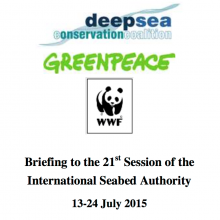The International Seabed Authority (ISA) will commence its annual meeting this week, during which it will debate sweeping new regulations to open vast expanses of the deep ocean to seabed mining.
Tasked by the United Nations Law of the Sea Convention with managing the quest for deep-sea mineral wealth in the international area of the seabed beyond coastal nations’ continental shelves, the ISA has thus far issued over a million square kilometres of exploratory permits to prospect for seabed minerals. At the meeting this week the ISA will begin to debate proposals for regulating commercial seabed mining and its environmental effects: to develop exploitation, as opposed to exploration, regulations.
Matthew Gianni of the DSCC said, “this is the deepest, most vulnerable and most risky environment on earth to operate in and should be treated with the utmost caution. We know very little about the deep sea but what we do know is that our actions can cause long-term damage to deep-sea species and ecosystems from which they may never recover. We owe it to future generations to ensure that we think before we act and gain a thorough understanding of the potential impacts of mining in the deep sea before any mining is permitted.”
Thus far the ISA has granted 26 ‘exploration’ licenses to explore the potential for mining gold, silver, copper, zinc, cobalt and other minerals found in polymetallic nodules on the deep-abyssal plains, sulphide deposit formed by hydrothermal vents and cobalt crusts on the slopes of seamounts. Each of these areas contains habitat types known to support a rich and often endemic biodiversity, critical to the wider ocean ecosystem.
Deep-sea ecosystems and species are characterized by low productivity and are thus extremely vulnerable to human disturbance. The international community has recognized this vulnerability through a series of UN resolutions adopted over the previous decade committing high seas fishing nations to take strict action to protect them from harmful fishing activities such as bottom trawling.
Duncan Currie, a legal advisor to the DSCC, who recently supported a local civil society action that won a court case in New Zealand to prevent a deep-sea mining project from commencing, says that the highest standards of environmental protection have to be employed. The only way to ensure this is through transparent and open proceedings at the ISA: “All ISA meetings need to be fully open – not just to those with an interest in enabling mining to proceed. It is after all the common heritage of humankind, and it is critical and only right that regulation is open and transparent to all who depend on the ecosystem services of the deep sea for a healthy and productive ocean: all humanity”.
The deep sea, commonly defined as the water column and seabed below 200 meters in depth, occupies 90% of the marine environment and is the largest biome on the planet. It functions as a key regulatory body of the entire biosphere, buffering bio-geochemical circulation, regenerating nutrients and hosting untold biodiversity richness, making it essential to all life on Earth. The ISA regulates deep seabed mining in the international area of the seabed beyond coastal nations’ continental shelves.
The DSCC argues that the deep ocean is a vital force within the Earth system and must be protected from harm. The priority approach to the consumption of mineral resources should be one of sustainability, reuse, improved product design and recycling of materials rather than exploring for new sources of minerals, including in the deep sea.
If deep-sea mining is permitted to occur, it should not take place until appropriate and effective regulations for exploration and exploitation are in place to ensure that the full range of marine habitats, biodiversity and ecosystem functions are protected, including through networks of marine protected areas and reserves.
The DSCC will be attending the meeting which is held in Jamaica between 13th and 24th July.
Read the DSCC Briefing to the International Seabed Authority for the 21st Session
Read the DSCC Position Statement Deep Sea Mining July 2015

